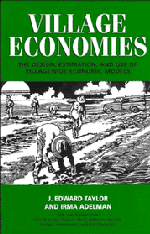Book contents
- Frontmatter
- Contents
- Acknowledgments
- 1 Introduction
- 2 Modeling village economies
- 3 The village economy and tenure security in West Africa: A Senegalese village SAM
- 4 Production and distribution in a dry-land village economy
- 5 Migration and the changing structure of a Mexican village economy
- 6 Economic linkages in a small regional economy: The case of Kutus Region, Kenya
- 7 Household nutrition and economic linkages: A village social accounting matrix for West Java, Indonesia
- 8 The village CGE: Basic model and estimation
- 9 Policy simulations
- 10 Conclusions
- Bibliography
- Index
7 - Household nutrition and economic linkages: A village social accounting matrix for West Java, Indonesia
Published online by Cambridge University Press: 05 June 2012
- Frontmatter
- Contents
- Acknowledgments
- 1 Introduction
- 2 Modeling village economies
- 3 The village economy and tenure security in West Africa: A Senegalese village SAM
- 4 Production and distribution in a dry-land village economy
- 5 Migration and the changing structure of a Mexican village economy
- 6 Economic linkages in a small regional economy: The case of Kutus Region, Kenya
- 7 Household nutrition and economic linkages: A village social accounting matrix for West Java, Indonesia
- 8 The village CGE: Basic model and estimation
- 9 Policy simulations
- 10 Conclusions
- Bibliography
- Index
Summary
Improving nutrition is a high development priority in Indonesia. The Indone sian government does not directly subsidize consumer prices for this purpose, but it invests considerable effort in monitoring nutritional status and uses nutritional improvement as one criterion for evaluating the impact of economic policies. Any accurate and useful evaluation depends on a clear understanding of which households are vulnerable to malnutrition, the source of household incomes, and likely avenues for household income growth.
The study presented here uses a social accounting matrix (SAM) framework to analyze the relationship between household nutrition and economic linkages in a West Javan village. Households in this village are grouped according to dietary energy consumption to identify sources of income for households of different nutritional status as a starting point for exploring the nutritional implications of village income change.
Survey data to estimate the SAM were collected by the author. The survey focused on household economic activities and on nutritional status at both household and individual levels from April 1988 to March 1989. The sample included 49 households (about 5 percent of the village population). Interviews were conducted with all working-age members of the household. The survey was carried out under a Cornell Food and Nutrition Policy Program technical assistance contract with the Indonesian Ministry of Health, funded by a World Bank loan.
The village setting, survey, and household classifications
Cibageur is located in the district of Sukabumi, West Java province. It is about one hour by public transport from the district capital and about three hours from the national capital city of Jakarta.
- Type
- Chapter
- Information
- Village EconomiesThe Design, Estimation, and Use of Villagewide Economic Models, pp. 146 - 181Publisher: Cambridge University PressPrint publication year: 1996
- 1
- Cited by



